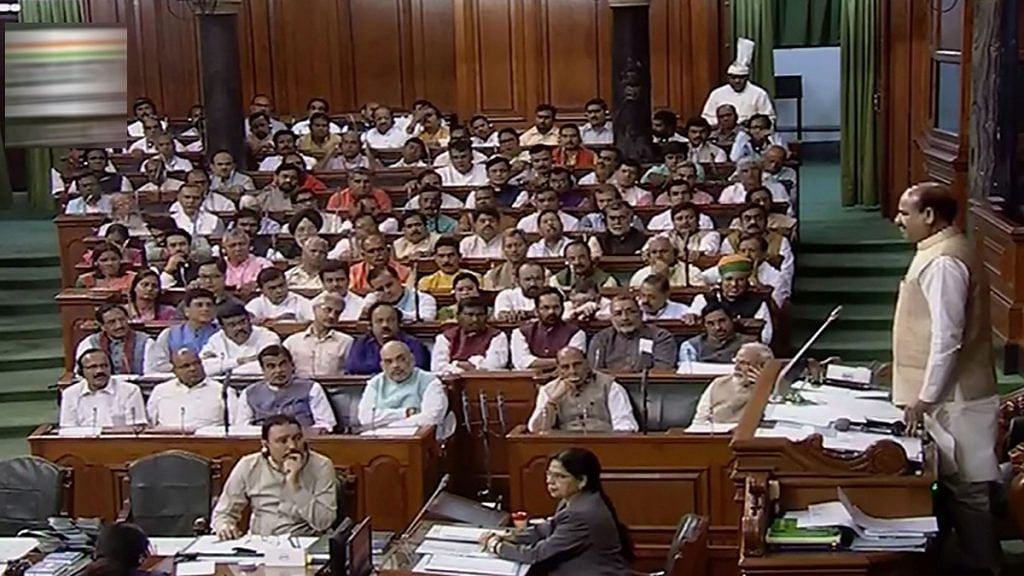In its first session, the 17th Lok Sabha has been working late into the evening on most days. On two days, the Lok Sabha even worked until midnight. The Narendra Modi government intends to get Parliament’s approval on 40 bills before the two houses adjourn on 26 July.
But the worrying trend here is that in this rush to pass listed bills, there is not enough scrutiny of them – a crucial aspect in the entire process where parliamentary committees assess the merits and demerits of the bill in question. So far, eight bills have been passed in the ongoing session but none were debated by a committee (and only on the floor of the House) – an issue that was highlighted by opposition MPs both inside and outside Parliament.
The non-scrutiny of bills by committees is an alarming factor. Fewer bills are being referred to parliamentary committees. While the 14th and 15th Lok Sabha (from 2004 to 2014) had scrutinised 60 per cent and 71 per cent bills, the 16th Lok Sabha scrutinised only 26 per cent of the total number of bills passed in Parliament.
Parliament’s primary job
Parliament is responsible for making laws for India’s more-than-a-billion citizens. Since laws impact every aspect of people’s lives, Parliament has to carefully deliberate and rigorously scrutinise every proposal before giving its approval.
Also read: Modi warns ministers against skipping Parliament, tells them to follow roster duties
In order to do this effectively, Parliament needs a robust law-making process, which is grounded in two broad principles. First, a nuanced technical debate by parliamentary subject committees followed by deliberations on the floor of the House to shape the government’s proposal into a law. Second, a periodic assessment of the functioning of that law to gain valuable feedback and insights, which can help in plugging gaps and taking corrective measures for better implementation of the law.
India’s parliamentary system implements both these principles with varying degrees of institutionalisation and compliance. Some laws are scrutinised in detail, while others are passed after only a debate on the floor of the House.
Committees that keep a check
The first principle stems from the understanding that laws are technical and require careful consideration. Since Parliament only meets for a limited amount of time during the year, it cannot discuss every legislative proposal in detail. For this, Parliament has a well-functioning system of committees. These committees comprise MPs from both the Houses. Their meetings are closed-door where MPs engage with experts, academics, members of the civil society, industry as well as government representatives on the technicalities of the bill. The reports of these committee are then looked into by the government to enable itself to fine-tune the proposed legislation.
For instance, bills like the Goods and Services Tax, Insolvency and Bankruptcy Code, Consumer Protection and Motor Vehicles Amendment were strengthened by deliberations of the parliamentary committees in the 16th Lok Sabha. Televised debates inside Parliament, on the other hand, mostly reflect the political viewpoints of MPs. The debate in House largely becomes an opportunity for MPs to grandstand rather than engage in the substantive issues of the law.
Also read: What an Indian law can do to MLAs defecting in Karnataka & Goa – nothing
Post-legislation scrutiny
However, the scrutiny of a bill by a parliamentary committee is not enough. Such scrutiny does not guarantee a well-functioning law. This is where the second principle – the post-legislative scrutiny of a law passed by Parliament – assumes significance. Earlier this month, the Delhi High Court made scathing remarks about the functioning of the law that prohibits the practice of manual cleaning of latrines and sewers.
Parliament passed a law in 1993 prohibiting the employment of manual scavengers. About a decade later, the law’s effectiveness was called into question in the Supreme Court of India. The Supreme Court issued an order asking the government to take immediate effective steps to end manual scavenging. Following the order, India’s Parliament passed another law in 2013, imposing further restrictions to curb the practice.
The statement of objects and reasons tabled before Parliament accompanying this law acknowledged the inadequacies of the 1993 law. It stated, “Existing laws have not proved adequate in eliminating the twin evils of insanitary latrines and manual scavenging.” Even though this law went through the rigours of a parliamentary committee process, manual scavenging continues to be prevalent in India more than six years since the law was enacted.
As per government data for 2018, approximately 53,000 people are still engaged in manual scavenging. Passage of two national legislation and interventions by the Supreme Court of India has not been able to put an end to the practice. Clearly then, Indian Parliament enacting a well-scrutinised and deliberated law is not enough. Parliament needs to regularly follow up on the implementation of laws that are being passed by it. Our parliamentary system, however, does not have an institutionalised mechanism to do so. In many countries, such post-legislative scrutiny is hardwired into their respective legislative processes.
Also read: India’s Constitution makers Nehru, Patel & Ambedkar were divided on parliamentary system
The National Commission to Review the Working of the Constitution, which was constituted in 2000, had observed in its reports that ‘our legislative enactments betray clear marks of hasty drafting and absence of Parliament scrutiny from the point of view of both the implementers and the affected persons and groups’.
It is high time India’s Parliament addresses the issue of robustness and sanctity of the legislative process. In the absence of these, the gap between the laws it makes and their implementation will widen to an extent that Parliament’s effectiveness as a law-making institution will routinely be called into question.
The author is the Head of legislative and civic engagement, PRS Legislative Research. Views are personal.
